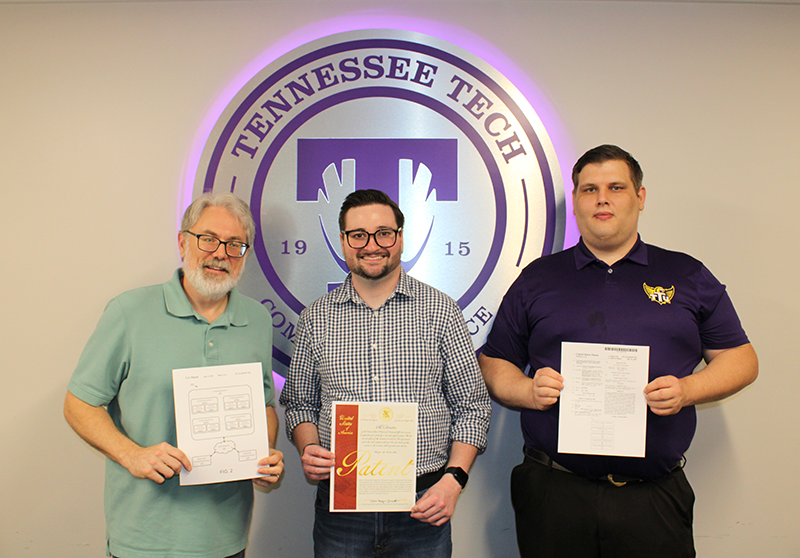Tennessee Tech students earn U.S. patent for cybersecurity innovation
Sometimes a master’s thesis turns into something much bigger – like a U.S. patent.
That’s exactly what happened for Tennessee Tech computer science Ph.D. student Bradley Northern, whose research laid the groundwork for a new cybersecurity innovation now recognized by the U.S. Patent and Trademark Office.
Northern, along with fellow Ph.D. students Trey Burks and Marlana Hatcher and faculty advisors Michael Rogers, Ph.D., and Denis Ulybyshev, Ph.D., (formerly of Tennessee Tech), filed for the patent in January 2023 and received approval in September.

“Our invention focuses on vulnerability and risk management in cybersecurity, particularly in modifying a user’s system based on publicly known vulnerabilities,” Northern said.
The technology collects information about software versions and hardware configurations across global systems and then analyzes risk using established cybersecurity standards.
“It takes in all the software versions and hardware that exist on the entire planet Earth and computes risk scores based on CVE (Common Vulnerabilities and Exposures) and current vulnerability data,” Northern said. “We take those scores from CVSS (Common Vulnerability Scoring System) and MITRE and compute a single risk score that we give back to the user.”
Burks said the system can then automatically enhance system security based on those results.
“We can take the results of those scores and modify the software on the system to make it more secure,” he said.
The project began in 2020 under the guidance of Ulybyshev, who encouraged the students to turn their ideas into a formal patent application.
“My master’s thesis was on this topic, and we had published a paper together that was based on cyber-physical systems,” Northern said. “When Dr. Ulybyshev approached us about pursuing a patent, we worked together to make it happen.”
For Burks, the collaboration offered a natural extension of his interests in cybersecurity and system protection.
“It fit well within my skillset as a cybersecurity student,” he said. “I worked on the portion that would change the insecure software to be more secure.”
The team’s research also revealed that downgrading software can sometimes actually strengthen security.
“A lot of software and hardware in the world is very vulnerable, but many companies don’t know how to either upgrade or downgrade their software,” Northern said. “We demonstrated with our software that you can actually downgrade your version and be more secure.”
The team credited Tennessee Tech’s Department of Computer Science and the Cybersecurity Education, Research and Outreach Center (CEROC) for helping to make their innovation possible.
“We’d also like to thank the university and all its resources,” Burks said.
The patent marks another highlight for Tennessee Tech’s computer science program and nationally recognized cybersecurity initiatives, which continue to create opportunities for students to transform classroom research into real-world innovation.

